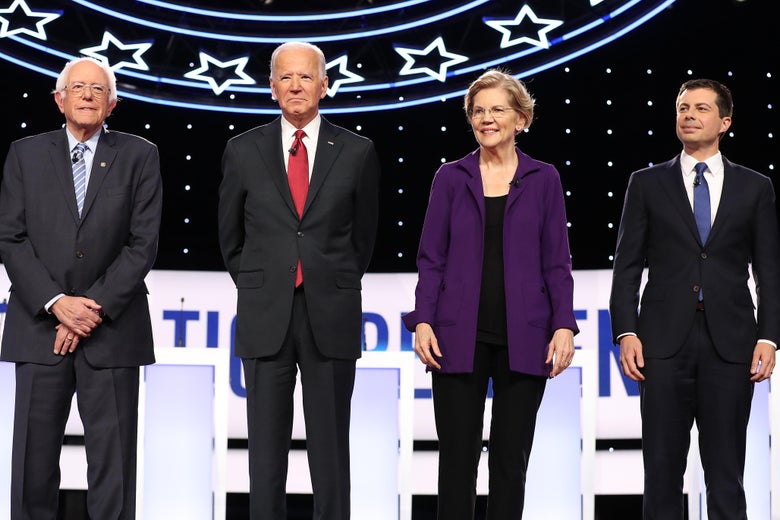
The candidates have been spending way more on Facebook than on Twitter.
Chip Somodevilla/Getty Images
On Wednesday, Twitter CEO Jack Dorsey announced that the platform would ban political ads around the world in late November. The move was a not-so-subtle rebuke of Facebook’s much-criticized policy of not fact-checking ads its platforms from politicians. It was also immediately interpreted as an act of baiting. The Washington Post published an article titled “Twitter placed the political ad ball in Facebook’s court,” while CNBC went with the headline “Mark Zuckerberg vs. Jack Dorsey is the most interesting battle in Silicon Valley.”
While Twitter’s decision seems to be garnering generally positive reactions—Virginia Sen. Mark Warner, Texas Rep. Dan Crenshaw, and New York Rep. Alexandria Ocasio-Cortez all praised the company—the 2020 presidential field is somewhat split on the ban. President Donald Trump’s campaign manager Brad Parscale called it “a very dumb decision for their stockholders,” while Joe Biden’s campaign put out a more measured statement: “It would be unfortunate to suggest that the only option available to social media companies to do so is the full withdrawal of political advertising, but when faced with a choice between ad dollars and the integrity of our democracy, it is encouraging that, for once, revenue did not win out.” Pete Buttigieg has called the ban a “bold step,” and Amy Klobuchar called on Congress to set consistent ad standards across Facebook and Twitter.
But do ads on Twitter… really matter? Because Twitter is used by so many politicians, journalists, activists, and, well, trolls, the platform overall plays an influential role in any presidential election. But business analysts estimate that money from political ads is not likely to be critical for Twitter’s revenues—and by extension, is probably not very critical to the campaigns. To get a sense of just how much the current presidential candidates are actually using social-media ads to rally support, here are the ad spending totals for each campaign, according to Facebook and Twitter’s databases on political ad spending:
Democrats
Amy Klobuchar
• Twitter: $87,100
• Facebook: $2,096,165
Andrew Yang
• Twitter: $20,600
• Facebook: $1,367,968
Bernie Sanders
• Twitter: $320,900
• Facebook: $4,200,696
Beto O’Rourke
• Twitter: $1,105,400
• Facebook: $9,084,474
Elizabeth Warren
• Twitter: $910,600
• Facebook: $4,728,318
Cory Booker
• Twitter: $51,200
• Facebook: 2,368,601
Joe Biden
• Twitter: $619,100
• Facebook: $2,808,898
John Delaney
• Twitter: $20,600
• Facebook: $226,862
Kamala Harris
• Twitter: $1,100,000
• Facebook: $3,469,319
Pete Buttigieg
• Twitter: $381,900
• Facebook: $4,955,126
Steve Bullock
• Twitter: $14,108.20
• Facebook: $280,911
Tulsi Gabbard
• Twitter: $181,100
• Facebook: $632,786
Michael Bennet
• Twitter: $30,431.9
• Facebook: $970,243
Julián Castro
• Twitter: $30,900
• Facebook: $1,806,272
Wayne Messam
• Twitter: Not listed as a political campaigning advertiser
• Facebook: $12,094
Joe Sestak
• Twitter: Not listed as a political campaigning advertiser
• Facebook: $641
Tom Steyer
• Twitter: $537,400
• Facebook: $12,172,272
Marianne Williamson
• Twitter: $26,900
• Facebook: $1,015,610
Republicans
Donald Trump
• Twitter: $6,568
• Facebook: $21,267,284
Joe Walsh
• Twitter: Not listed as a political campaigning advertiser
• Facebook: $61,115
Bill Weld
• Twitter: Not listed as a political campaigning advertiser
• Facebook: $25,510
So as of Thursday, the candidates currently running for president have spent roughly $5.4 million on Twitter ads and $73.5 million on Facebook ads. Such a comparison is obviously limited in its usefulness as the two companies are operating on very different scales. Twitter had roughly 145 million daily active users in the last quarter, and earned $3.04 billion in revenue last year. Facebook had 2.45 billion daily active users and earned $55.8 billion in revenue. In addition, the scope of Twitter’s ban is much wider than the presidential campaign: Ads for any election and any political issue in any country are no longer allowed. The 2020 presidential campaign ad spending is just a slice of that.
It seems safe to say, though, that the campaigns are relying a lot more on Facebook than they are on Twitter. If Facebook were to implement a similar ban, it would radically change the political ad spending landscape. In the end, it seems like Twitter didn’t really need the campaigns, and the campaigns didn’t really need Twitter.
Readers like you make our work possible. Help us continue to provide the reporting, commentary and criticism you won’t find anywhere else.
Join Slate Plusfrom Slate Magazine https://ift.tt/323Ftif
via IFTTT
沒有留言:
張貼留言